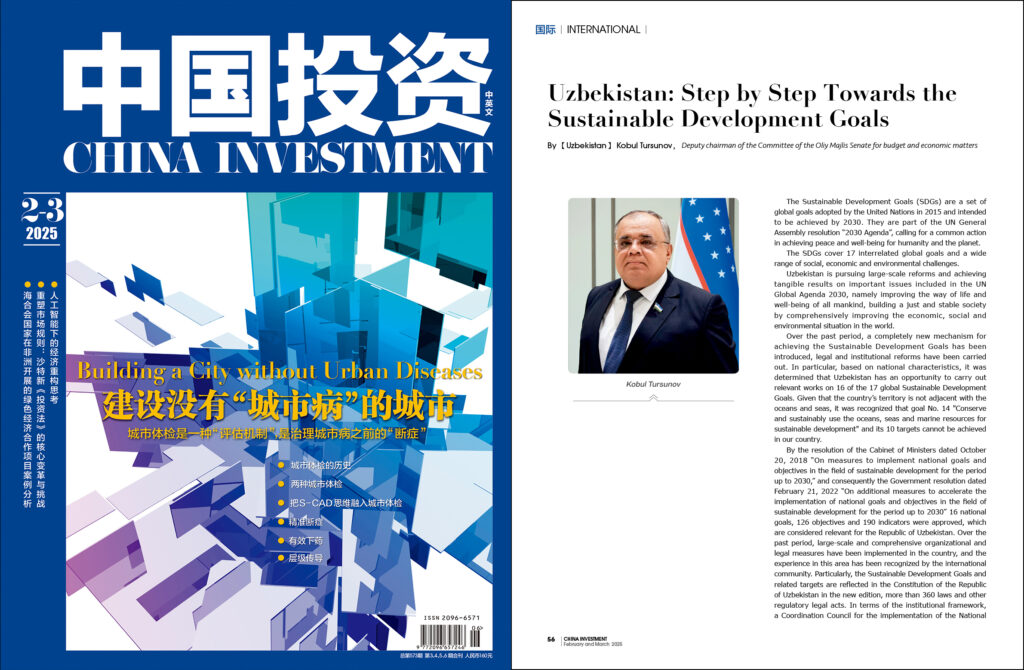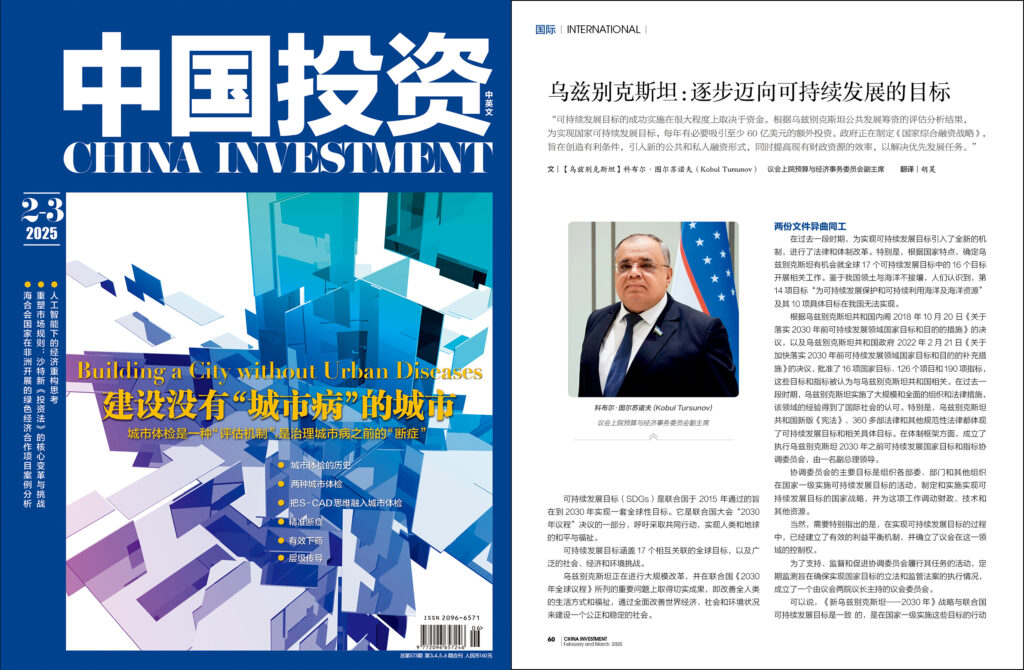Uzbekistan: Step by Step Towards the Sustainable Development Goals 乌兹别克斯坦:逐步迈向可持续发展的目标

By 【Uzbekistan】 Kobul Tursunov, Deputy chairman of the Committee of the Oliy Majlis Senate for budget and economic matters
文|【乌兹别克斯坦】科布尔·图尔苏诺夫(Kobul Tursunov) 议会上院预算与经济事务委员会副主席 翻译|胡昊
导读
●两份文件异曲同工
● 多措并举实现可持续发展目标
● 议会国际合作促进目标实现
The Sustainable Development Goals (SDGs) are a set of global goals adopted by the United Nations in 2015 and intended to be achieved by 2030. They are part of the UN General Assembly resolution “2030 Agenda”, calling for a common action in achieving peace and well-being for humanity and the planet.
The SDGs cover 17 interrelated global goals and a wide range of social, economic and environmental challenges.
Uzbekistan is pursuing large-scale reforms and achieving tangible results on important issues included in the UN Global Agenda 2030, namely improving the way of life and well-being of all mankind, building a just and stable society by comprehensively improving the economic, social and environmental situation in the world.

⬆ Tashkent City, Uzbekistan
Over the past period, a completely new mechanism for achieving the Sustainable Development Goals has been introduced, legal and institutional reforms have been carried out. In particular, based on national characteristics, it was determined that Uzbekistan has an opportunity to carry out relevant works on 16 of the 17 global Sustainable Development Goals. Given that the country’s territory is not adjacent with the oceans and seas, it was recognized that goal No. 14 “Conserve and sustainably use the oceans, seas and marine resources for sustainable development” and its 10 targets cannot be achieved in our country.
By the resolution of the Cabinet of Ministers dated October 20, 2018 “On measures to implement national goals and objectives in the field of sustainable development for the period up to 2030,” and consequently the Government resolution dated February 21, 2022 “On additional measures to accelerate the implementation of national goals and objectives in the field of sustainable development for the period up to 2030” 16 national goals, 126 objectives and 190 indicators were approved, which are considered relevant for the Republic of Uzbekistan. Over the past period, large-scale and comprehensive organizational and legal measures have been implemented in the country, and the experience in this area has been recognized by the international community. Particularly, the Sustainable Development Goals and related targets are reflected in the Constitution of the Republic of Uzbekistan in the new edition, more than 360 laws and other regulatory legal acts. In terms of the institutional framework, a Coordination Council for the implementation of the National Goals and Objectives of Sustainable Development of Uzbekistan until 2030 was established, headed by the deputy Prime Minister.
The main objective of the Coordination Council is to organize the activities of ministries, departments and other organizations in implementing the SDGs at the national level, develop and implement national strategies to achieve the SDGs and mobilize financial, technical and other resources for this work.
Certainly, it should be especially noted that an effective mechanism for balancing interests in achieving the Sustainable Development Goals has been created and parliamentary control in this area has been established.
In order to support, control and facilitate the activities of the Coordination Council in fulfilling its tasks, implementing regular monitoring of the implementation of legislative and regulatory acts aimed at ensuring the fulfillment of national goals and objectives, a Parliamentary Commission chaired by the heads of the chambers of the Oliy Majlis has been established.
It is safe to say that the Strategy “New Uzbekistan – 2030” is harmonized with the UN Sustainable Development Goals and serves as an action program for their implementation at the national level.
The main elements of the synergy of these two documents are reflected in several areas.
First, it is the unity of common goals in the documents. The main goals of the Strategy of New Uzbekistan are defined in accordance with the 17 global Sustainable Development Goals. The Strategy defines specific objectives aimed at achieving the SDGs in such areas as economic growth, social development, environmental stability, protecting human rights, gender equality, improving the quality of education, health care system, and others.
Second, the social orientation of these documents. Both documents pay considerable attention to the development of human capital, improving the well-being of the population, reducing poverty and ensuring social justice. The Strategy of New Uzbekistan identifies measures aimed at improving the quality of life of people by increasing investment in education, health care, social protection and other social spheres.
Third, focus on ensuring economic stability. The Strategy of New Uzbekistan is aimed at ensuring economic growth, creating new jobs, building a competitive economy and stimulating innovation in line with the Sustainable Development Goals. It emphasizes the importance of environmental compliance and rational use of natural resources to achieve sustainable economic growth.
Fourth, both documents are aimed at ensuring environmental sustainability. The Strategy of New Uzbekistan aims to protect the environment, combat climate change, rationally utilize natural resources and introduce eco-friendly technologies in compliance with the environmental goals of the SDGs. The Strategy defines specific objectives to develop a “green economy,” expand the use of renewable energy sources and address environmental challenges.
Fifth, these documents emphasize partnership and cooperation. Hence, the Strategy of New Uzbekistan is aimed at strengthening international cooperation, attracting foreign investments, and introducing advanced technologies and experience in line with the SDG goal of “Partnerships for the Goals”. It emphasizes the importance of cooperation with the UN, other international organizations, foreign states and civil society institutions.
In general, the Strategy of the New Uzbekistan is an expression of the Sustainable Development Goals at the national level and serves their implementation. The close harmony of these two documents ensures the progressive advancement of Uzbekistan along the path of sustainable development.
Indeed, by determining budget policy, parliament contributes to meeting the citizens’ needs and ensuring the country’s development.
Successful implementation of the SDGs largely depends on their funding. It is no secret that today the achievement of the SDGs around the world requires the mobilization of large financial resources. According to the World Bank, the volume of investments required to achieve the SDGs ranges from 2 trillion to 4 trillion dollars per year, that is, about 14 percent of global GDP.
According to the results of the assessment analysis of public development financing in Uzbekistan, in order to achieve the national SDGs, it is necessary to attract additional investments in the amount of at least 6 billion dollars annually.
In this regard, the government is developing a Comprehensive National Financing Strategy aimed at creating favorable conditions for introducing new forms of public and private financing and simultaneously increasing the effectiveness of available financial resources to address priority development tasks.
In this regard, the parliament also occupies a special place, as it is the legislative body that creates the basis for sustainable economic development and investment attraction.
Today, Uzbekistan is actively reforming the legal and regulatory framework to support private entrepreneurship and create favorable conditions for the inflow of investments aimed at SDGs.
In order to stimulate entrepreneurial activity, develop new markets such as ecotourism and eco-construction, systems of tax, non-tax benefits and preferences are being revised.
Particular attention is paid to creating legal conditions to stimulate targeted investments, including support for introducing innovative financial instruments such as green finance, diaspora bonds, SDG bonds and sukuk.
For this purpose, a practice of reviewing the State Budget submitted to the Parliament every year from the point of view of financing projects and programs implemented within the framework of national development goals has been established.
For example, if in 2024 69 percent of the State Budget expenditures were directed to the implementation of the SDGs, then in 2025 this figure will be 72 percent.
All these measures are based on the principle of “Uzbekistan is a social state,” enshrined in our Constitution in the new edition.
This principle provides for a further improvement of the people’s well-being, a radical change in the economy, accelerated development of entrepreneurship, ensuring human rights and interests.
Voluntary national reviews on the Sustainable Development Goals are an important tool for assessing and sharing countries’ experiences in implementing the 2030 Agenda for Sustainable Development.
They perform a number of important functions. Primarily, such reports are associated with demonstrating the progress of countries, and Voluntary national reviews provide countries with an opportunity to demonstrate the achievements, challenges and lessons learned along the way to achieving the SDGs. They show the degree of governments’ commitment to their obligations.
Voluntary national reviews are also of great importance in ensuring accountability. These reports hold governments accountable for their policies and practices. They contribute to strengthening public control and transparency of decision-making processes.
National reports provide an essential platform for countries to share experiences, learn from best practices and strengthen cooperation to achieve the SDGs.
Additionally, information and analysis provided in Voluntary national reviews helps governments to develop and improve national policies and strategies to achieve the SDGs.
Parliament plays an important role in the preparation and implementation of such reports. For four years now, the Parliamentary Commission has been actively involved in the preparation of the Voluntary national reviews.
In particular, with the participation of members of the Parliamentary Commission, the first and second Voluntary national reviews of Uzbekistan on the implementation of the Sustainable Development Goals were prepared and presented at high-level political forums under the auspices of the UN Economic and Social Council (ECOSOC) in 2020 and 2023.
Today, many international organizations and parliaments of foreign countries highly appreciate Uzbekistan’s efforts in achieving the Sustainable Development Goals.
Of course, it was challenging to achieve this progress. The main foundation for these achievements was laid by the President of Uzbekistan.
At the 75th session of the UN General Assembly held in 2020, President Shavkat Mirziyoyev put forward an initiative to adopt a draft resolution on “Strengthening the role of parliaments in accelerating the achievement of the Sustainable Development Goals”.
As part of the implementation of this initiative, Sustainable Development Goals Week was organized for the first time in 2021. At the end of the week, the first global forum of inter-parliamentary cooperation in achieving the Sustainable Development Goals was held in Bukhara for the first time in world history.
Undoubtedly, forums dedicated to the Sustainable Development Goals are held in almost all countries of the world.
The importance of the forum organized by Uzbekistan was that for the first time in world history, a country took the initiative to draw the attention of parliaments to this issue, strengthen parliamentary control in the area, and establish inter-parliamentary cooperation.
The forum was attended by more than 500 participants from more than 100 countries, the leaders of the Inter-Parliamentary Union, the The Parliamentary Assembly of the OSCE, the Asian Parliamentary Assembly, the CIS Inter-Parliamentary Assembly, and the Parliamentary Assembly of Turkic States. Following the forum, the Bukhara Declaration was adopted. An important aspect of the forum was the discussion of the draft resolution “On strengthening the role of parliaments in accelerating the achievement of the Sustainable Development Goals,” proposed by the leader of Uzbekistan at the 75th session of the UN General Assembly.
The parliaments of more than 80 countries made their proposals and recommendations to the draft resolution. As a result, on December 14, 2022, at the 77th session of the UN General Assembly, the resolution was unanimously approved by all UN member states.
In terms of what led to the adoption of this resolution, firstly, it has become a distinctive program document for the parliaments of the world, the image of Uzbekistan in the international arena has been further enhanced, and secondly, the role of parliaments in achieving sustainable development goals has been further strengthened and the effectiveness of parliamentary control over the government’s activities in this direction has increased.
The efforts in this area have not stopped there. In order to widely promote Uzbekistan’s experience, exchange views with other parliamentarians, learn about national and international best practices in the participation of governmental organizations, agencies and civil society institutions, educational, research and analytical centers, as well as to discuss relevant issues for the future, a Sustainable Development Month was held in October-November 2023. On November 30, 2023 the second Global Forum on Inter-Parliamentary Cooperation in achieving the Sustainable Development Goals was organized in Tashkent.
The event was attended by the Secretary General of the Inter-Parliamentary Union, the President of the OSCE Parliamentary Assembly, the Chairman of Inter-Parliamentary Assembly, the Secretary General of the Parliamentary Assembly of Turkic States (TURKPA), heads and deputies of foreign parliaments, international experts, representatives of ministries and departments, non-governmental non-profit organizations and the media (more than 300 participants from more than 50 countries and foreign organizations).
Following the event, the participants adopted the Tashkent Communiqué, covering current aspects of inter-parliamentary cooperation in achieving the SDGs.
Achieving the Sustainable Development Goals is a long-term and complex process that requires continuous efforts and updates. The country is also actively working in this area, and several important areas that should be implemented in the future are identified.
First, work on a deeper integration of the Sustainable Development Goals into national policy will be consistently continued. Work will be organized to fully incorporate SDG principles into national strategies, programs in all areas, including state, industry and regional programs and plans, and ensure their interrelation.
Second, parliamentary control will be strengthened, measures will be taken to improve legislation and raise the work on regular review of government reports to a new level.
Third, the system for monitoring national goals and objectives will be strengthened. Together with the Government, specific, measurable, achievable, relevant and time-bound (SMART) indicators for each SDG are under development and their implementation is regularly monitored. This includes digitalization and the widespread use of modern technologies.
Fourth, work is underway to further expand and improve the efficiency of financing mechanisms for the Sustainable Development Goals.
In order to provide the financial resources necessary to achieve the SDGs, measures will be taken to gradually increase funds allocated from the State Budget.
Mechanisms for further expanding private sector participation in SDGs financing will be developed through corporate social responsibility, social investment and other mechanisms. Particular attention will be paid to development of public-private partnership projects.
Efforts will also be expanded to introduce “green” bonds, “green” loans and other innovative financial instruments to finance sustainable projects.
Fifth, measures will be taken to further strengthen social partnership. Non-governmental non-profit organizations, public associations, the media and other civil society institutions will be more actively involved in the SDG implementation process.
Work will be strengthened to inform the general public about the SDGs, encourage their participation and take their opinions into account.
Sixth, scientific research aimed at solving urgent problems in the field of sustainable development is supported, practical measures are taken to widely use digitalization, artificial intelligence, “green” technologies and other innovations in the process of achieving the SDGs. Of course, the implementation of the above measures requires the active participation of all stakeholders, in particular, parliament, government, civil society, business representatives and academia
Ultimately, all these measures will contribute to the sustainable development of Uzbekistan, creation of a sustainable and inclusive economy, development of the social sphere and environmental protection.

可持续发展目标(SDGs)是联合国于 2015 年通过的旨在到2030年实现一套全球性目标。它是联合国大会“2030 年议程”决议的一部分,呼吁采取共同行动,实现人类和地球的和平与福祉。
可持续发展目标涵盖17个相互关联的全球目标,以及广泛的社会、经济和环境挑战。
乌兹别克斯坦正在进行大规模改革,并在联合国《2030年全球议程》所列的重要问题上取得切实成果,即改善全人类的生活方式和福祉,通过全面改善世界经济、社会和环境状况来建设一个公正和稳定的社会。
两份文件异曲同工
在过去一段时期,为实现可持续发展目标引入了全新的机制,进行了法律和体制改革。特别是,根据国家特点,确定乌兹别克斯坦有机会就全球17个可持续发展目标中的16个目标开展相关工作。鉴于我国领土与海洋不接壤,人们认识到,第14项目标“为可持续发展保护和可持续利用海洋及海洋资源”及其10项具体目标在我国无法实现。
根据乌兹别克斯坦共和国内阁 2018 年10月20 日《关于落实2030年前可持续发展领域国家目标和目的的措施》的决议,以及乌兹别克斯坦共和国政府 2022年2月21日《关于加快落实2030年前可持续发展领域国家目标和目的的补充措施》的决议,批准了16项国家目标、126个项目和190项指标,这些目标和指标被认为与乌兹别克斯坦共和国相关。在过去一段时期,乌兹别克斯坦实施了大规模和全面的组织和法律措施,该领域的经验得到了国际社会的认可。特别是,乌兹别克斯坦共和国新版《宪法》、360多部法律和其他规范性法律都体现了可持续发展目标和相关具体目标。在体制框架方面,成立了执行乌兹别克斯坦2030年之前可持续发展国家目标和指标协调委员会,由一名副总理领导。
协调委员会的主要目标是组织各部委、部门和其他组织在国家一级实施可持续发展目标的活动,制定和实施实现可持续发展目标的国家战略,并为这项工作调动财政、技术和其他资源。
当然,需要特别指出的是,在实现可持续发展目标的过程中,已经建立了有效的利益平衡机制,并确立了议会在这一领域的控制权。
为了支持、监督和促进协调委员会履行其任务的活动,定期监测旨在确保实现国家目标的立法和监管法案的执行情况,成立了一个由议会两院议长主持的议会委员会。
可以说,《新乌兹别克斯坦——2030年》战略与联合国可持续发展目标是一致 的,是在国家一级实施这些目标的行动纲领。
这两份文件协同作用的主要因素体现在几个方面:
首先是文件中共同目标的统一。《新乌兹别克斯坦战略》的主要目标是根据17个全球可持续发展目标确定的。该战略确定了在经济增长、社会发展、环境稳定、保护人权、性别平等、提高教育质量、医疗保健系统等领域实现可持续发展目标的具体目标。
第二,这些文件的社会导向。这两份文件都十分重视发展人力资本、改善人民福祉、减少贫困和确保社会公正。《新乌兹别克斯坦战略》确定了旨在通过增加对教育、医疗保健、社会保障和其他社会领域的投资来提高人民生活质量的措施。
第三,注重确保经济稳定。《新乌兹别克斯坦战略》旨在根据可持续发展目标确保经济增长、创造新的就业机会、建设有竞争力的经济和激励创新。该战略强调遵守环境法规和合理利用自然资源对实现可持续经济增长的重要性。
第四,这两份文件都旨在确保环境的可持续性。《新乌兹别克斯坦战略》旨在保护环境、应对气候变化、合理利用自然资源和引进生态友好型技术,以实现可持续发展目标中的环境目标。该战略确定了发展“绿色经济”、扩大使用可再生能源和应对环境挑战的具体目标。
第五,这些文件强调伙伴关系与合作。因此,《新乌兹别克斯坦战略》旨在加强国际合作,吸引外国投资,引进先进技术和经验,以实现可持续发展目标中的“目标伙伴关系”目标。它强调了与联合国、其他国际组织、外国和民间社会机构合作的重要性。
总体而言,《新乌兹别克斯坦战略》是可持续发展目标在国家一级的体现, 并为其实施服务。这两份文件的密切协调确保乌兹别克斯坦沿着可持续发展的道路逐步前进。

⬆ “新乌兹别克斯坦”独立纪念碑公园
多措并举实现可持续发展目标
事实上,议会通过确定预算政策,为满足公民需求和确保国家发展做出了贡献。
可持续发展目标的成功实施在很大程度上取决于资金。如今,在世界各地实现可持续发展目标需要调动大量财政资源,这已不是什么秘密。根据世界银行的数据,实现可持续发展目标所需的投资额每年从2万亿美元到4万亿美元不等,约占全球国内生产总值的14%。
根据乌兹别克斯坦公共发展筹资的评估分析结果,为实现国家可持续发展目标,每年有必要吸引至少60亿美元的额外投资。
政府在这方面正在制定《国家综合融资战略》,旨在创造有利条件,引入新的公共和私人融资形式,同时提高现有财政资源的效率,以解决优先发展任务。
在这方面,议会也占有特殊地位,因为它是为可持续经济发展和吸引投资创造基础的立法机构。
今天,乌兹别克斯坦正在积极改革法律和监管框架,以支持私人创业,为可持续发展目标投资的流入创造有利条件。
为了刺激创业活动,开发生态旅游和生态建设等新市场,正在修订税收、非税收优惠制度。
特别注意创造法律条件,刺激有针对性的投资,包括支持引入创新金融工具,如绿色金融、侨民债券、可持续发展目标债券和伊斯兰债券。
为此,确定了每年从资助在国家发展目标框架内实施的项目和方案的角度,审查提交给议会的国家预算的做法。
例如,如果2024年69%的国家预算支出用于实施可持续发展目标,那么2025年这一数字将达到72%。
所有这些措施都是基于我国新版《宪法》规定的 “乌兹别克斯坦是一个社会国家 ”的原则。
这一原则规定要进一步改善人民的福祉,彻底改变经济,加快创业发展,确保人权和利益。
可持续发展目标国家自愿审查是评估和分享各国实施2030年可持续发展议程经验的重要工具。
它们发挥着一系列重要作用。自愿性国家审查为各国提供了一个机会,展示在实现可持续发展目标的道路上所取得的成就、面临的挑战和汲取的经验教训。
自愿性国家审查对于确保问责制也非常重要。这些报告要求政府对其政策和做法负责。它们有助于加强公共监督和提高决策过程的透明度。
国家报告为各国分享经验、学习最佳实践和加强合作以实现可持续发展目标提供了一个重要平台。
此外,自愿性国家审查中提供的信息和分析有助于各国政府制定和改进实现可持续发展目标的国家政策和战略。
议会在编写此类报告和实施过程中发挥着重要作用。四年来,议会委员会一直积极参与编写国家自愿审查报告。
特别是,在议会委员会成员的参与下,编写了乌兹别克斯坦关于可持续发展目标执行情况的第一次和第二次国家自愿审查报告,并于2020年和2023年在联合国经济及社会理事会(经社理事会)主持的高级别政治论坛上提交。
今天,许多国际组织和外国议会高度赞赏乌兹别克斯坦为实现可持续发展目标所做的努力。
议会国际合作促进目标实现
当然,取得这些进展是具有挑战性的。乌兹别克斯坦总统为这些成就奠定了主要基础。
在2020年举行的第75届联合国大会上,沙夫卡特·米尔济约耶夫总统提出了一项倡议,即通过一项关于《加强各国议会在加快实现可持续发展目标方面的作用 》的决议草案。
作为实施这一倡议的一部分,2021年首次举办了可持续发展目标周。在该周结束时,世界历史上首次在布哈拉举办了议会间合作实现可持续发展目标全球论坛。
毫无疑问,世界上几乎所有国家都举办了专门讨论可持续发展目标的论坛。
乌兹别克斯坦举办的这次论坛的重要性在于,在世界历史上第一次有一个国家主动提请各国议会关注这一问题,加强议会在这一领域的控制,并建立议会间合作。
来自100多个国家的500多名与会者、各国议会联盟、欧安组织议会大会、亚洲议会大会、独联体议会大会和突厥语国家议会大会的领导人出席了论坛。论坛之后通过了《布哈拉宣言》。论坛的一个重要方面是讨论了乌兹别克斯坦领导人在联合国大会第七十五届会议上提出的《关于加强议会在加快实现可持续发展目标方面的作用》的决议草案。
80多个国家的议会对该决议草案提出了提案和建议。结果,在2022年12月14日召开的第77届联合国大会上,该决议获得了所有联合国会员国的一致通过。
就该决议获得通过的原因而言,首先,该决议已成为世界各国议会的特色纲领性文件,进一步提升了乌兹别克斯坦在国际舞台上的形象;其次,进一步加强了议会在实现可持续发展目标方面的作用,提高了议会对政府在此方面活动的监督效力。
这方面的努力并没有停止。为了广泛推广乌兹别克斯坦的经验,与其他议员交流意见,了解国家和国际在政府组织、机构和民间社会机构、教育、研究和分析中心参与方面的最佳做法,以及讨论未来的相关问题,2023年10月至11月举办了可持续发展月活动。2023年11月30日,在塔什干举办了第二届议会间合作实现可持续发展目标全球论坛。
各国议会联盟秘书长、欧安组织议会大会主席、国际议会大会主席、突厥语国家议会大会秘书长、外国议会首脑和代表、国际专家、部委和部门代表、非政府非营利组织和媒体(来自50多个国家和外国组织的300多名与会者)参加了此次活动。
活动结束后,与会者通过了《塔什干公报》,内容涉及各国议会在实现可持续发展目标方面的合作现状。
实现可持续发展目标是一个长期而复杂的过程,需要不断努力和更新。我国也在积极开展这方面的工作,并确定了今后应实施的几个重要领域。
首先,要坚持不懈地继续开展将可持续发展目标更深入地纳入国家政策的工作。将组织开展工作,将可持续发展目标的原则充分纳入国家战略、各领域的计划,包括国家、行业和地区的计划和规划,并确保它们之间的相互关系。
第二,加强议会监督,采取措施完善立法,将定期审查政府报告的工作提高到一个新水平。
第三,加强对国家目标的监督。与政府一道,为每项可持续发展目标制定具体、可衡量、可实现、相关和有时限的指标,并定期监测其执行情况。这包括数字化和现代技术的广泛应用。
第四,正在努力进一步扩大和提高可持续发展目标筹资机制的效率。
为了提供实现可持续发展目标所需的财政资源,将采取措施逐步增加国家预算拨款。
将通过企业社会责任、社会投资和其他机制,建立进一步扩大私营部门参与可持续发展目标筹资的机制。将特别关注公私伙伴关系项目的发展。
还将扩大努力,引入“绿色”债券、“绿色 ”贷款和其他创新金融工具,为可持续项目提供资金。
第五,采取措施进一步加强社会伙伴关系。非政府非营利组织、公共协会、媒体和其他民间社会机构将更加积极地参与可持续发展目标的实施进程。
将加强向公众宣传可持续发展目标的工作,鼓励公众参与并考虑他们的意见。
第六,支持旨在解决可持续发展领域紧迫问题的科学研究,采取切实可行的措施, 在实现可持续发展目标的过程中广泛使用数字化、人工智能、“绿色 ”技术和其他创新成果。当然,上述措施的实施需要所有利益攸关方的积极参与,特别是议会、政府、民间社会、企业代表和学术界。
最终,所有这些措施都将有助于乌兹别克斯坦的可持续发展、创造可持续的包容性经济、发展社会领域和保护环境。

